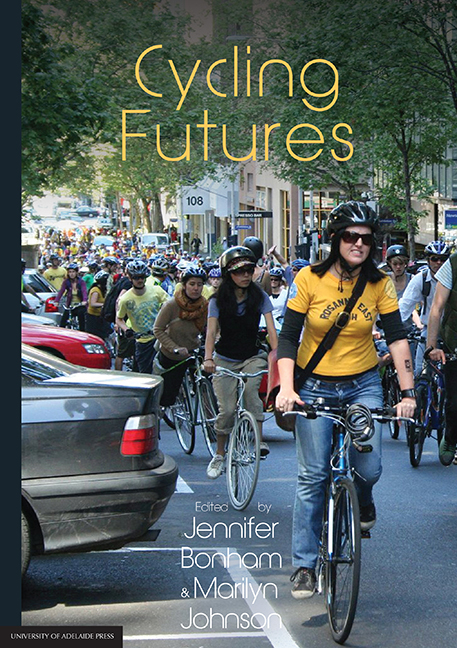Book contents
- Frontmatter
- Contents
- Preface
- Editors
- Contributors
- PART I Current challenges
- PART II Strategies for change
- 9 Gender and cycling: Gendering cycling subjects and forming bikes, practices and spaces as gendered objects
- 10 Making (up) the child cyclist: Bike Ed in South Australia
- 11 More than a message: Producing cyclists through public safety advertising campaigns
- 12 Spaces for cycling
- 13 Off-road cycling infrastructure
- 14 Teaching Australian civil engineers about cycling
- 15 What should planners know about cycling?
- 16 Skilling landscape architects and urban designers for design of bicycle parking and network facilities
- 17 Cycling and Australian law
10 - Making (up) the child cyclist: Bike Ed in South Australia
from PART II - Strategies for change
Published online by Cambridge University Press: 25 July 2017
- Frontmatter
- Contents
- Preface
- Editors
- Contributors
- PART I Current challenges
- PART II Strategies for change
- 9 Gender and cycling: Gendering cycling subjects and forming bikes, practices and spaces as gendered objects
- 10 Making (up) the child cyclist: Bike Ed in South Australia
- 11 More than a message: Producing cyclists through public safety advertising campaigns
- 12 Spaces for cycling
- 13 Off-road cycling infrastructure
- 14 Teaching Australian civil engineers about cycling
- 15 What should planners know about cycling?
- 16 Skilling landscape architects and urban designers for design of bicycle parking and network facilities
- 17 Cycling and Australian law
Summary
Introduction
Today we have two issues which often intersect: first, widespread concern among health professionals about childhood obesity, and its causes and effects on children's general health status; and second, concern among geographers and sociologists about children's active, independent mobility and their diminishing use of public space. This chapter undertakes an analysis of a South Australian program, Bike Ed, which aims to address such concerns through cycling skills development and safety education, encouraging increased physical activity through active travel and greater access to public space.
While such programs appear to have multiple benefits, evaluations are few. This chapter examines a 2012 Bike Ed program in Adelaide, South Australia, through a Foucauldian lens, thereby raising questions about the ways in which the program and its practices shape ‘the child’ as a particular kind of subject — a child subject with arguably sole responsibility for its own safety. The paradoxical result is that a program designed to encourage cycling acts to reinforce the norms of automobile culture — whilst, however, retaining spaces for contestation.
The chapter proceeds in three steps. First, it will explain the analytic strategy applied. Next, the chapter briefly introduces the Bike Ed program. Third, the chapter will duly interrogate and describe the texts of Bike Ed and their effects.
Theory and analytic strategy
The chapter takes as its point of departure the position identified in Chapter One of this volume (Bonham & Johnson) and further developed in Bonham, Bacchi and Wanner (Chapter Nine, this volume) and Nielsen and Bonham (Chapter Eleven, this volume) that subjects have to be understood, not as sovereign and pre-social, but as formed through ongoing practices. The target in this chapter is ‘the child’ and specifically ‘the cycling child’.
As historical accounts of children show, ‘the child’ and ‘childhood’ are culturally constituted categories; children's worlds and lives have been shaped by adult concepts of childhood and its significance in different times and places. Though children were once regarded as small adults, taken for granted as part of adult life and not seen as needing special treatment (Ariès, 1962; Holloway & Valentine, 2000; Cunningham, 2005), their lives and bodies have now been politicised: they carry unrecognised social burdens (Colls & Hörschelmann, 2010; Ruddick, 2010), becoming both ‘an idea and a target’, with childhood ‘the most intensively governed sector of personal existence’ (Rose, 1999, p. 123).
- Type
- Chapter
- Information
- Cycling Futures , pp. 203 - 228Publisher: The University of Adelaide PressPrint publication year: 2015



